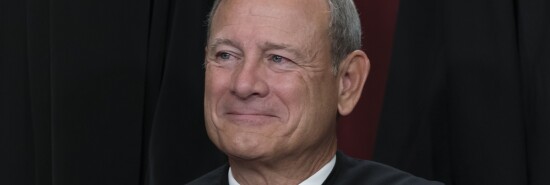
Chief Justice Roberts could benefit from exchange of views on ethics reform
Quin Hillyer
Video Embed
Even if his concerns were not entirely unfounded, Chief Justice John Roberts was probably unwise to reject so categorically an invitation to appear at a Senate Judiciary Committee meeting.
Now, however, he should offer an alternative.
ROBERTS DECLINES REQUEST TO TESTIFY BEFORE JUDICIARY COMMITTEE
Senate Judiciary Committee Chairman Richard Durbin (D-IL) had asked Roberts to testify at his committee’s May 2 meeting about Supreme Court ethics reform. It is unusual for justices to appear before Congress, except perhaps in discussions about annual appropriations for the court system. As Roberts said in his letter declining the invitation, he is right to have “separation of powers concerns” and to stress “the importance of preserving judicial independence.”
As I wrote on April 20, the possibility of a spectacle involving camera-mad senators browbeating a chief justice while politically charged cases are on the docket is reason enough for Roberts not to testify in May. On the other hand, if he were to wait until the court’s summer recess begins in July, he would have time to prepare and for him and Durbin to establish appropriate ground rules. Those rules could ensure his treatment is respectful and focused on constructive, substantive discussions of how the court’s ethics, and its reputation, can be better safeguarded.
Roberts should see respectful exchanges with Durbin as a win-win, both because of his well-known concern for the court’s public reputation and because it would also give him a chance to dispel misperceptions about why the Supreme Court has different ethics rules from other courts to start with. Roberts also could and should use exchanges with the Senate as a way to highlight justifiable apprehension about justices’ safety in the wake of protests at justices’ homes and the harassment of justices in public places (and one wacky assassination plan), all while the Justice Department refuses to enforce laws against such mob behavior.
True, that topic is unrelated to ethics reform, but if Roberts is going to waive his unease about having the head of one separate branch of government give testimony to a committee of another, he should have the chance to bring up issues of his own. Fair is fair.
Meanwhile, it should be said that Roberts’s letter to Durbin is in some ways thin gruel. He downplays other times chief justices have testified before Congress, but by listing those occasions, he acknowledges there is no hard precedent against testimony when it is deemed mutually beneficial.
Furthermore, if President Gerald Ford could voluntarily testify to Congress, as he did in 1974, what makes the chief justice more special or more immune to the supposed indignity than the president is?
CLICK HERE TO READ MORE FROM THE WASHINGTON EXAMINER
Wisely or not, Roberts has made clear he is opposed to live, in-person testimony. So he should offer a different proposal. He should say he is willing, during the court’s summer recess, to answer written questions from Judiciary Committee members within certain ground rules if the subject matter is on both ethics and the justices’ safety. That way, there would be no chance of demagogic senators “playing to the cameras” and unduly browbeating, or appearing to browbeat, the head of an independent judiciary.
One way or another, Congress is going to weigh in on judicial ethics reform. Roberts should want the high court’s institutional perspective considered, explained, and publicized. If he doesn’t engage with lawmakers and then misguided “reforms” are forced on the court without his input, the fault will be his own.
